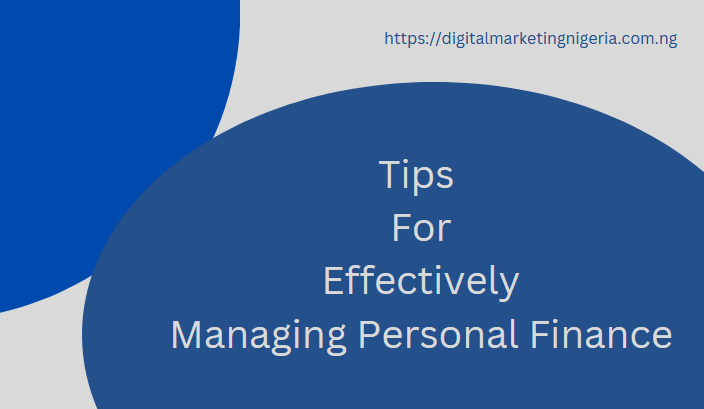You don’t need a high-paying job or a windfall from a relative to improve your personal financial situation. For many people, good money management can reduce spending, increase investment and savings, and achieve financial goals that once seemed impossible. In this well detailed article, we shall be exploring 10 tested and proven tips for effectively managing personal finance.
Even if you feel like your financial situation is hopeless and there is no way out, there are many things you can do to create a better situation for yourself.
1. Know your net worth
The first on our list of tested and proven tips for properly managing personal finance is knowing your net worth. Your net worth (the difference between your assets and debts) is a big number that tells you about your financial health. Keep an eye on it to help you track your progress toward your financial goals or remind you when you’re going backwards.
2. Be financially educated
Manage your financial future with some simple books on personal finance. Once you have the knowledge, don’t let anyone get you out of the way, even if it means encouraging you to spend money or planning expensive trips and activities that your friends can’t afford. Before using the services of a professional, such as a financial planner, mortgage lender or accountant, research their services.
3. Check your interest rate
Q: Which loan should you pay off first? Answer: The highest interest rate. Question: What type of bank should you open? Answer: Best interest rate. Q: Why does credit card debt give us a headache? Answer: Break it down by compound interest. Bottom line: Paying interest will help you understand which expenses or savings you should focus on.
4. Track your expenses
Tracking your expenses is another tested and proven strategy for managing personal finance, it help to improve your financial health. If you don’t know what and where you spend each month, your personal expenses have a chance to improve.
Also read: 14 Failure-proof ways to finance new business idea successfully.
Better money management starts with customer awareness. Use a financial management tool like MoneyTrack to track your spending across all categories and see for yourself how much you spend each day on things like food, entertainment, and even coffee. Once you understand these habits, you can develop strategies to improve them.
5. Creating financial reports/plan
If you don’t trust yourself to remember to pay your quarterly taxes or pull your credit report regularly as required, consider scheduling reminders for those important accounts such as your utility bills, gas, foodstuff, transportation etc. Put in place a plan for offsetting these bills, it is a good place to start.
6. Follow the plan
Sixth on our list of tested and proven tips for managing personal finance is following the plan. Once you choose a plan, try it for at least a month. You need a long time to see if it works for you. If you do less, you won’t see the results of focusing on your finances.
So find the coin you want to try, get started and stick with it. Simple. If you’re interested, Washington recommends “surrounding yourself with images that represent your goals.” So if you’re saving for your next international trip, you can post photos of your dream trip to keep your goals top of mind.
7. Create a monthly budget
Use your monthly spending habits and your monthly take-home pay to determine a budget you know you can keep. There is no use in setting a tight budget as a major change; for example, no longer eating out when ordering food four times a week. Create a budget that suits your lifestyle and spending habits.
You should think of your budget as a way to encourage good habits, such as cooking at home more often, but also give yourself the ability to meet the budget. This is the only way to manage money.
8. Increase your savings, even if it takes time
Create an emergency fund that you can use in unforeseen situations. Even if your contribution is small, these funds can protect you from dangerous situations such as having to borrow money at high interest rates or not being able to pay your bills on time.
If you lose your job, you should make general savings to increase your financial security. Use automated programs (such as the FSCB program) to grow these funds and encourage the habit of saving money.
8. Pay your monthly bills on time
Paying your bills on time is an easy way to manage your money and has great benefits: It helps you delay payments and keep track of your expenses. A good history of on-time payments can improve your credit score and increase your interest rates.
9. Cut down on your expenditures
Have you signed up for a service you don’t use? Even if you don’t use streaming services and mobile apps regularly, it’s easy to forget that these services charge your bank account.
Track your spending style and consider eliminating unnecessary purchases to save more each month, this is another tested and proven strategy for managing personal finance.
10. Start an investment plan
Starting an investment plan for yourself is the last but not the least on our tested and proven tips for managing personal finance. Even if your ability to invest is limited, a small contribution to an investment account can help you generate additional income with the money you earn.
Find any means to add other sources of income to your earning, that will be a bonus, then open a retirement account or other investment.
Conclusion
Effectively managing personal finance leads to financial health starts with changing your behavior. Some of these changes will be harder than others, but if you stick with these changes and be disciplined enough, you’ll have a good financial management system that will work throughout your life thereby saving enough money in your pocket as you grow old.

